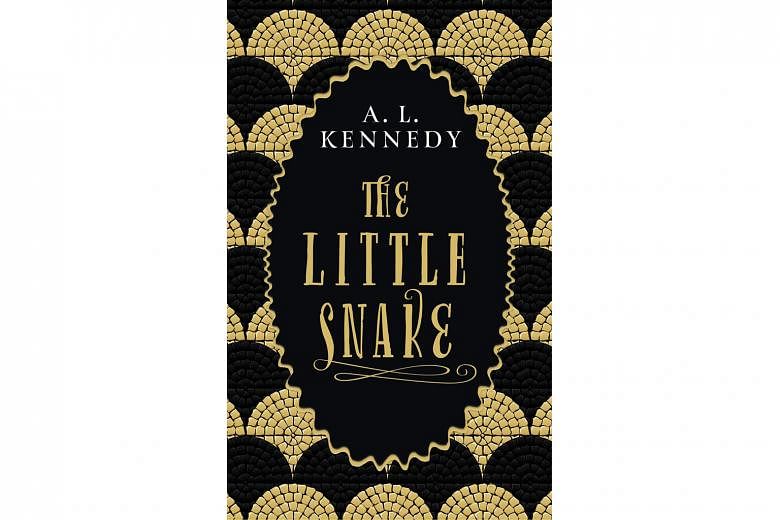FICTION
THE BLUE SALT ROAD
By Joanne M. Harris
Gollancz/215 pages/$23.32 without GST from major bookshops/
Rating: 3.5/5
THE LITTLE SNAKE
By A.L. Kennedy
Canongate/132 pages/$20.95 from Books Kinokuniya/
Rating: 4/5
Fairy tales and fables are the most elemental of stories. Their roots go back to the oral tradition, their characters are birthed in myth and magic, and the best exemplars are compact narratives that manage shades of grey even when dealing with black and white divisions of good and evil.
Two slender novellas from women writers revisit these forms to varying effect.
Joanne M. Harris, best known for her best-selling 1999 novel Chocolat, offers an intriguing gender-bending twist on the age-old Celtic myth of the selkie, a freewheeling creature belonging to the sea, with The Blue Salt Road.
In this fairy tale, it is a canny human girl, Flora McCraiceann, who steals the selkie's seal skin while he is in human form and tricks him into marriage. Usually, it is a female selkie who is forced into marriage and domesticity.
In the age of #MeToo, a gendered remaking of the selkie myth is very plugged into the now. When the reader first meets Flora, she is a strong-minded girl who knows what she wants. As she declares to her mother: "I will catch myself a prince, and bear a pretty princeling, and all the girls of the island shall envy my good fortune."
Of course, this being a dark modern fairy tale, it should come as no surprise that there is no happy ending. The selkie cannot be tamed but by trickery and deceit, never a good beginning to any relationship.
The necessity of unravelling this tangled web of lies leads the narrative on a detour in the last third that bogs down the pacing. Harris is too good a writer to let political correctness dictate her narrative, but the uneven pacing also demonstrates the pitfalls of attempting to remake old-fashioned tropes in contemporary forms.
While Flora is powerful in her convictions and actions, as a character, she is also trapped in a world which measures female success with marriageability and reproductive success.
The selkie is similarly stuck in the gender role of the footloose male, who is unfairly trapped by feminine wiles.
What saves this tale is its lyrical setting - an icy, storm-swept seascape where the forces of nature rule the actions of creatures both human and supernatural - aided by Bonnie Hawkins' evocative pen-and-ink illustrations.
Scottish writer A.L. Kennedy escapes the trope trap by borrowing from the fable tradition rather than following a fairy-tale structure, and the looser narrative construction allows her more wriggle room.
The Little Snake offers a talking snake that befriends a little girl. Mary, like all brave children in fables, is singularly unfazed by the appearance of a verbal serpent in her garden and promptly befriends Lanmo. This golden snake, as he visits Mary at different points in her life, sees her home falling apart because of war and decides to help her escape its ravages.
The evolution of Lanmo's point of view, from indifference to love as Mary's open-hearted generosity and easy acceptance moves him to empathy, is handled with tender delicacy.
And by the end of the tale, the reader is also moved to empathy by this unlikely friendship.
A fable traditionally comes with a moral, but Kennedy avoids a straightforward one. Her happy ending for her refugee protagonists instead chooses a fairy-tale closure which, in its own way, pays tribute to the tidy lessons of fables.
In choosing to tackle the messier grey areas of contemporary issues in such traditional forms, both Harris and Kennedy reiterate the evergreen nature of these stories and how they can still help readers grapple with the urgent issues of the day.
If you like this, read: The Bear And The Nightingale by Katherine Arden (Del Rey, 347 pages, paperback, $18.14, Books Kinokuniya), an enchantingly menacing fairy tale about a young Russian girl, Vasilisa, whose world, filled with spirits both benign and monstrous, is threatened with the advent of logic and monotheistic faith.



